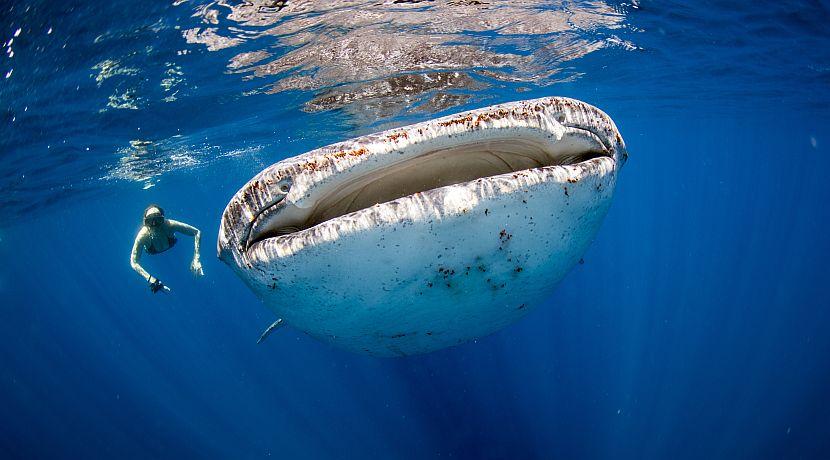With one of the most deceptive names in the animal kingdom, you can be forgiven for being unsure of exactly what one of these magnificent animals is. To help us all out, the dictionary definition is: “a very large tropical fish which typically swims very closely to the surface. It is the largest known fish.” Whilst this tells you a lot of what you need to know about these huge ocean dwellers, they are one of the most fascinating creatures in the world and there is still a lot to learn about them.
You said they are big, but just how big are we talking?

The title of the biggest fish in the ocean is not one that is easily earned, but the whale shark has done just that. When you are told that the mouth of the shark alone can be up to 1.5 meters wide, it is only then that you begin to appreciate the true scale of these beasts. The average size of an adult whale shark is estimated to be around 10 meters long, and they weigh an average of 9 tonnes! There have however been some recorded incidents of whale sharks reaching lengths of up to 12.65 meters long.
If they are that big then they must tackle some hefty prey?

You may be shocked to hear that the whale shark feeds off of some of the smallest animals in the sea. These monstrous creatures eat plankton, krill, fish eggs, and on occasion some small fish. Whale sharks are filter feeders, and they eat through ram filtration which is where the shark swims at its chosen prey, pushing both the food and water into its mouth. It is estimated that even the juvenile whale sharks eat around 21 kilograms of plankton per day to sustain its mass and grow!
Where do they live to gather this much plankton?

By File:Rhincodon typus distmap.png, CC BY-SA 3.0, https://commons.wikimedia.org/w/index.php?curid=17...
Whale sharks love warm waters, and as a result they can be found in areas of the world’s oceans which sit alongside the equator. Large feeding aggregations occur at several coastal sites all around the world including; Mafia Island off the coast of Tanzania, Utila in Honduras, and Baja in California! Whale sharks prefer to swim in the shallows as this is where their food sources are, but they can dive to a depth of at least 1,286 meters when needed.
If I dive with the whale sharks, will I be in any danger?

Despite their size, whale sharks do not pose any real danger to people. They are docile and passive fish, and show no signs of aggression when confronted with a human. There are rules in place to prevent any contact with the whale shark to protect the fish from distress, so should you ever have the chance to dive with them we ask that you adhere to these rules for the benefit of the sharks!
Are the whale sharks endangered and how can I help?
Due to the vastness of the world’s oceans, there is currently no good estimate for how many whale sharks are left in the wild. The IUCN has classified the whale shark as vulnerable due to their long life span and late maturation, and as a result efforts need to be increased to ensure that they are protected. You can help by volunteering with the whale sharks. Whale shark volunteers help by taking part in whale shark research; recording numbers, sizes, genders, and other information, and helping research teams to understand these gentle giants better.














